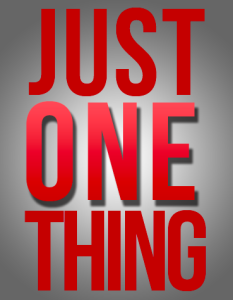 The “Just One Thing” Series at Management Excellence is intended to provoke ideas and actions around topics relevant to our success and professional growth. Use them in good health and great performance!
The “Just One Thing” Series at Management Excellence is intended to provoke ideas and actions around topics relevant to our success and professional growth. Use them in good health and great performance!
—
To the extent that we struggle to see our own weaknesses, we are remarkably naïve and blind to our strengths.
This gap in our own view-of-self is in my experience more detrimental to career success and personal-professional satisfaction than the issues surrounding our alleged weaknesses.
Sadly, most of our developmental and feedback discussions focus on the weaknesses. While it is instructive and eye opening to learn about the quirks and oddities of our behaviors that make people around us nuts, the real gold that often goes un-mined is all about our strengths.
The strengths give us locomotive power…they put the vertical in our climb up the corporate ladder. The weaknesses create resistance and noise, but the strengths fill our sails and propel us forward.
At Least 4 Reasons Why We Struggle to See Our Own Strengths:
1. Too often, we define our view-of-self around our position or title…Sales Manager, Marketing Manager, Executive etc., and not around the skills and behaviors that make us valuable in a wide variety of roles. Professionals who have struggled through an unexpected career interruption will often describe one of the key challenges they faced as having to let go of the position or title and instead focus on identifying, cultivating and marketing transferable strengths. You are not your title.
2. When feedback is available, it tends to focus on the constructive or negative. When positive feedback is provided, it’s often not very specific and definitely not described in clear, business-focused behavioral terms. How many times have you sat across from a manager who offered, “You are remarkably talented at…, and we should find opportunities for you to apply and further develop this talent.”
One of the most powerful moments in my career came from a colleague who worked with me on a challenging project for a major prospective customer. After guiding the group through our proposal and fielding questions from a committee of 30 (seriously!), his comment during our ride home was, “Whatever you do in your career, it should involve guiding groups of people through complex issues. You simplified the process, engaged the people and positively impacted psychology of the room to great effect.”
That comment is one that would have never occurred to me…I identified with my role as a senior product and marketing manager. In part, it positively altered my approach to my work and it definitely helped me make some major, valuable moves in my career.
3. The biases have it. There’s a whole litany of cognitive biases that all of us march around with and that distort our view-of-self. When we look in the mirror, we don’t see our strengths or our “professional beauty,” we see the flaws.
For whatever reason, we’re wired to focus on the blemishes and mistakes and not the true value that we bring to a picture. I shadowed a coaching client who was preoccupied with the negative feedback in a recent 360-degree review. What he didn’t know was that in every setting I observed him, his primary value was one of guiding a team through a messy problem to a clear-cut approach. He did it by facilitating and using framing tools and helping the team focus on the right issues, and he had no idea that this was his true superpower! Many years later, he is an outstanding and successful strategy consultant.
4. We don’t ask for input on our strengths. When was the last time that you asked for feedback on what you do really well?
A remarkable professional that I’ve worked with over the years is truly blind to his strengths and superpowers, and I have from time-to-time offered very clear input on these and his reaction typically ranges from shock to pleasant surprise. He is not wired to understand the positive impact he has on almost any challenging business situation and requires regular reminders to keep cultivating his remarkable skills.
The Bottom-Line for Now:
You can spend a lifetime not overcoming your weaknesses, or, you can spend a lifetime cultivating your strengths. I opt for the latter. Now, all you need to do is clear your mind, screw up your courage and face reality. You are truly remarkable at something! Find it, ask about it, and then start tuning out the noise you are hearing from your weaknesses and focus on the good work of applying and developing your strengths.
—
Don’t miss the next Leadership Caffeine-Newsletter! Register here
For more ideas on professional development-one sound bite at a time, check out: Leadership Caffeine-Ideas to Energize Your Professional Development.
New to leading or responsible for first time leaders on your team? Subscribe to Art’s New Leader’s e-News.
An ideal book for anyone starting out in leadership: Practical Lessons in Leadership by Art Petty and Rich Petro.






Leave A Comment